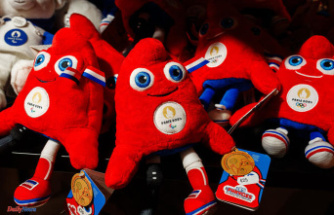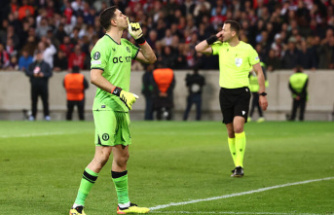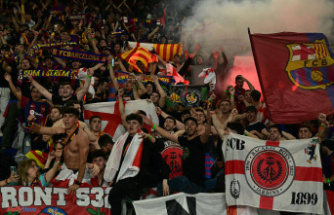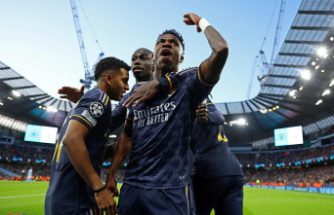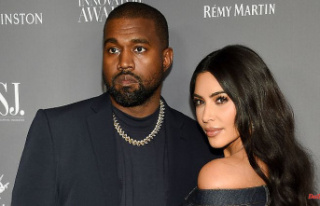Red Bull is a success story. And it would not have been possible without the entrepreneurial courage of Dietrich Mateschitz. Now the 78-year-old has died after a serious illness. At home he is revered as a hero. But there are also many people who evaluate him critically.
Dietrich Mateschitz was a media man. He wasn't a person for the media. Perhaps because he sensed a media dictatorship in his home country of Austria. Maybe because he just preferred being a silent protagonist. Both stories are told about the 78-year-old founder of the Red Bull empire, who died on Saturday after a serious illness. But what remains now? Which story about the billionaire from Sankt Marein im Mürztal wins the sovereignty? That of the marketing genius? That of the charismatic visionary who was always so attentive and interested? Or that of a powerful man with a questionable ethos?
The person Dietrich Mateschitz stands in gigantic contrast to the appearance of his empire. Wherever Red Bull senses attention, wherever Red Bull could reach a young, hip community, the group from Fuschl am See strikes. The two red bulls are as omnipresent in mainstream sports as they are in extreme sports. Mateschitz had nothing to do with this omnipresence. He didn't want anything to do with it. And that's why hardly anything is known about the billionaire's private life. For example, the "FAZ" encountered resistance seven years ago when researching Mateschitz. The dignitaries in Fuschl am See, which is near Salzburg, did not want to comment. There is also nothing to be heard in the village of Sankt Marein. The FAZ spoke of a kind of "collective vow of silence" at the time.
The Austrian became a multi-billionaire with his company. He shaped and sponsored successful generations of athletes with Red Bull. These include the winter sports legends Lindsey Vonn, Marcel Hirscher and Gregor Schlierenzauer. Lifestyle, adventure, risk, borderline experiences. Extreme sport with a crazy high-gloss look, main characters as heroes. And he himself: the robust Styrian, always tanned, casual three-day beard, the leather jacket just draped over his broad shoulders. Close but unapproachable.
As opaque as the wall surrounding private individuals is, their success story, which began in Thailand in 1984, is well known. There he drank the first Aufputschlimo of his life - and made it his life's work. The busy marketing employee at Jacobs coffee and Blendax toothpaste became a courageous visionary and eventually one of the richest men in the world. In the same year, Mateschitz founded Red Bull GmbH with the Yoovidhya entrepreneurial family from Thailand. The stimulant drink was launched on the market in 1987 with a slightly modified recipe for the Thai Krating Daeng and the development of a marketing concept. He himself is said to have drunk up to twelve cans a day.
Red Bull grew mighty wings and the company flew past everything that is associated with the Alpine Republic abroad. A few years ago, the Austrian magazine Dossier raved that Red Bull was "better known than the Blue Danube Waltz, sold better than the Sachertorte and traveled more around the world than the Vienna Boys' Choir". It is "more valuable than Swarovski and more daring than skiing legend Hermann Maier". Anyone who is familiar with the circumstances of the country knows that this is a canonization. Mastermind Mateschitz never received one, but old surveys already indicate a kind of saint status in the country. The "Tiroler Zeitung" reported in the mid-2010s that 59 percent had a good opinion of him and only 9 percent had a bad one.
Apparently, his wealth did not raise any great envy. At the end of September, Forbes magazine ranked him 75th among the world's super-rich with assets of 19 billion US dollars. After all, he is said to own castles, airplanes and an island in the South Seas. He should own ice hockey clubs and two Formula 1 teams. doesn't matter. Only with football did the understanding stop. Not in Austria, of course. But in Germany. From 2009, RB Leipzig replaced TSG Hoffenheim from patron Dietmar Hopp as the number one hate object. A team that bluntly debunked the mantra "money doesn't score goals" enraged football traditionalists. The rejection was exacerbated by the fact that this club, in which you cannot become a member, has a strange behavior with its partner team from Salzburg, i.e. sells players back and forth.
Mateschitz didn't mind. Because if it bothered him, he would have interfered. He just let things go his own way. Just like in 2016 on ServusTV. At the time, the employees of the controversial broadcaster wanted to set up a works council. The billionaire was furious and threatened to take the station offline and fire all employees. In the end it is said to have been a misunderstanding. A works council should never be established. More than 200 employees signed a letter in which they spoke out against the establishment of employee representation. The absurd end of an absurd posse. The patriarch obviously liked this submissive behavior. ServusTV is still broadcasting today.
ServusTV, that was the channel that Mateschitz placed against the alleged dictate of opinion. And if he hadn't liked the way the station had developed, he would have intervened. That corona deniers and conspiracy theorists spread their world views there and director Ferdinand Wegscheider openly sympathizes with lateral thinkers' views. Apparently that didn't bother the 78-year-old. Unlike the country's refugee policy. In 2017 he gave an interview to two journalists in which he rumbled powerfully. In doing so, he came close to right-wing populism. Appropriate: His media project Addendum was repeatedly criticized for the right-wing populist orientation of the media organizations. Another project started in September last year: Pragmaticus was born. The self-definition: "Away from daily political debates, experts publish their content unadulterated to a large extent." A press release promised: "Pragmatism instead of ideology, a calm tone of voice instead of alarmism will be the motto. And with an optimistic attitude based on a humanistic world view."
But as critical as he was viewed from some quarters, he was admired for his work. For him, Mateschitz is the most impressive entrepreneur "we've ever had in Austria, if not worldwide," said Mercedes team boss Toto Wolff: "He created a brand and an area that didn't exist before. What he did for the sport has and how much he has given to the sport has not existed before." In 2005, Red Bull Racing celebrated its Formula 1 premiere, initially ridiculed as a party squad, five years later respected as world champions. With Sebastian Vettel, the team won the driver's and constructor's titles four times in a row. Formula 1 also returned to Austria - to the Red Bull Ring, of course. On this occasion, the billionaire had around 5,000 houses freshly painted with his financial aid in 2014, new garden fences created or fresh plants planted.
The spectacular Red Bull investment in extreme sports was also not only viewed favorably worldwide - sports such as wingsuit flying guaranteed extreme attention, but also extreme danger. As early as April 2013, the ARD documentary "The Dark Side of Red Bull" reported on six athletes who died in their dangerous sport with the support of Red Bull. Meanwhile, stratospheric jumper Felix Baumgartner became world famous when he jumped out of a helium balloon from a height of 38,969 meters in October 2012 and returned to earth with a parachute. He too is a person with highly questionable political views. A person who got and gets a platform on ServusTV.
"We knew that he was in a difficult state of health," said Red Bulls motorsport boss Helmut Marko, a good friend of Mateschitz, now on Sky: "Now that it has happened, it is still incredible that such a great personality had to resign ." Mateschitz was "unique". "His merit and visions," says Marko, "reflect a unique personality." Mateschitz held 49 percent of the shares in the company, while the family of his Thai business partner held the other 51 percent. It is not clear who will take over the management of the company. For a few years now, his son, whom Mateschitz has with his former partner, has been developed as a potential successor.
(This article was first published on Sunday, October 23, 2022.)


